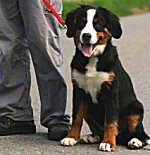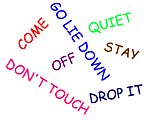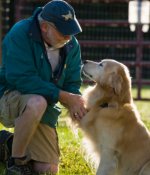Newfoundlands: What's Good About 'Em, What's Bad About 'Em
Newfoundland temperament, personality, training, behavior, pros and cons, advice, and information, by Michele Welton, Dog Trainer, Behavioral Consultant, Author of 15 Dog Books

The AKC Standard says, "Sweetness of temperament is the hallmark of the Newfoundland."
Calm, dignified, and generally quiet, this big breed does best in a spacious home in the suburbs or country, preferably in a non-humid climate, ideally with access to a lake or pond. Newfoundlands love love love the water!
To stay fit, a Newf needs long daily walks. He loves to romp in the snow, and pulling a cart or carrying a backpack gives him a purpose in life. Did I mention that he loves to swim?
This kindly breed is good-natured with everyone, especially children, though they should be as well-behaved as he is. He is very sociable and needs more companionship than many other breeds. Newfoundlands don't do well when left alone for long periods.
Early socialization with lots of nice people and other dogs is critical in developing a stable temperament. Some male Newfoundlands are aggressive with other male dogs, and a very few may be dominant-aggressive toward people. Excessive shyness is also seen.
Though good-natured, the Newfoundland must learn his manners, and he does have an independent streak. But he responds pretty well to patient training based on respect. Motivate him with praise and food rewards, plus gentle, fair corrections. Females are most willing to please, while males may be more hardheaded.
Newfoundlands pant a lot, drink a lot (sometimes dunking half of their head into their water bucket), and are champion droolers.
If you want a dog who...
- Is heavily-built and powerful, with a thick furry coat
- Is usually polite with everyone
- pulling carts and sleds, romping in cold weather, and swimming
- Is responsive to training in a slow, good-natured way
A Newfoundland may be right for you.
If you don't want to deal with...
- A very bulky dog who takes up a lot of space in your house and car
- A heavy dog who wants to sit on your feet, lie on your lap, and lean his weight against your leg
- Rowdiness and exuberant jumping when young
- "Separation anxiety" and destructiveness when left alone too much
- Fearfulness in some lines, or when not socialized enough
- Some stubbornness and/or dominance problems, especially in males
- Heavy shedding
- Slobbering and drooling
A Newfoundland may not be right for you.
 |
Dog Breed Traits – Which Traits Are Right For You? In this brand new series, I'll help you decide which dog breed traits would best suit you and your family, your home and yard, and your lifestyle, so you can choose the best dog breed for your family. |
Keep in mind that the inheritance of temperament is less predictable than the inheritance of physical traits such as size or shedding. Temperament and behavior are also shaped by raising and training.
FREE eBooks by Michele Welton
![]() "Respect Training for Puppies" and "Teach Your Dog 100 English Words" are free step by step guides to teaching your pup to be calm and well-behaved.
"Respect Training for Puppies" and "Teach Your Dog 100 English Words" are free step by step guides to teaching your pup to be calm and well-behaved.
![]() "11 Things You Must Do Right To Keep Your Dog Healthy and Happy" is a free guide to keeping your dog mentally, physically, and emotionally happy and healthy so you can enjoy a longer lifetime of companionship.
"11 Things You Must Do Right To Keep Your Dog Healthy and Happy" is a free guide to keeping your dog mentally, physically, and emotionally happy and healthy so you can enjoy a longer lifetime of companionship.

- You can avoid some negative traits by choosing an ADULT dog from an animal shelter or rescue group. With an adult dog, you can easily see what you're getting, and plenty of adult Newfoundlands have already proven themselves not to have negative characteristics.
- If you want a puppy, you can avoid some negative traits by choosing the right breeder and the right puppy.
More traits and characteristics of the Newfoundland
If I was considering a Newfoundland, I would be most concerned about...
- Providing the proper balance of exercise. Young Newfoundlands need enough exercise to keep them lean and healthy, but not so much that their soft growing bones, joints, and ligaments become over-stressed and damaged. Adult Newfoundlands need more exercise to keep them in shape, but not in hot or humid weather for fear of overheating. The proper amount of exercise can be difficult to regulate in giant breeds.
Since you have to minimize their exercise, young Newfoundlands can be very rambunctious. They will romp with uncoordinated gawkiness all over your house. You need to substitute extra quantities of companionship and supervision. Otherwise, left alone, young Newfoundlands become bored and destructive, and their powerful jaws can literally destroy your living room.
- Separation anxiety. More than most other breeds, Newfoundlands need a great deal of companionship and do not like being left alone for more than a few hours. They tend to express their unhappiness through destructive chewing.
- Providing enough socialization. Young Newfoundlands need careful exposure to people and to unusual sights and sounds. Otherwise their natural caution can become shyness or suspiciousness, which in such a huge dog can be very difficult to live with.
- Strong temperament, especially in males. Newfoundlands are good-natured, yes.... but they're not pushovers to raise and train. Some Newfoundlands, especially young males, are very willful and require a firmer hand than you might have hoped when you brought home that cuddly puppy! You must establish the right Leader-Follower relationship with a Newfoundland at a young age.
To teach your Newfoundland to listen to you, "Respect Training" is mandatory. Follow my free online training programs.
- Potential dog aggression, especially in males. Many Newfoundlands are perfectly peaceful with other dogs, but some are decidedly NOT peaceful. Adolescent and young adult males, especially, can be pushy or downright aggressive toward other male dogs.
- Heavy shedding. Newfoundlands are one of the heaviest shedders of all breeds. You'll find hair and fur all over your clothing, upholstery, carpeting, under your furniture, even in your food. Frequent vacuuming will become a way of life. Make sure you're really up for this!
- Slobbering. As with shedding, most people are not prepared for how much Newfoundlands slobber and drool, especially after eating or drinking. When they shake their heads, you will be toweling saliva off your furniture and walls. In fact, experienced Newf owners hang towels near their dog's food and water dishes.
- Serious health problems. The lifespan of a Newfoundland is short, usually less than 10 years, and an alarming number are crippled by bone and joint diseases or succumb to cancer, well before that time. Read more about Newfoundland Health.
My best-selling books – now available FREE on my website
 Respect Training For Puppies: 30 seconds to a calm, polite, well-behaved puppy is for puppies 2 to 18 months old. Your puppy will learn the 21 skills that all family dogs need to know. Click here to read for free.
Respect Training For Puppies: 30 seconds to a calm, polite, well-behaved puppy is for puppies 2 to 18 months old. Your puppy will learn the 21 skills that all family dogs need to know. Click here to read for free. Teach Your Dog 100 English Words is a unique Vocabulary and Respect Training Program that will teach your adult dog to listen to you and do what you say. Click here to read for free.
Teach Your Dog 100 English Words is a unique Vocabulary and Respect Training Program that will teach your adult dog to listen to you and do what you say. Click here to read for free. 11 Things You Must Do Right To Keep Your Dog Healthy and Happy helps your dog live a longer, healthier life. Get my honest advice about all 11 Things before you bring home your new puppy, because some mistakes with early health care cannot be undone. Click here to read for free.
11 Things You Must Do Right To Keep Your Dog Healthy and Happy helps your dog live a longer, healthier life. Get my honest advice about all 11 Things before you bring home your new puppy, because some mistakes with early health care cannot be undone. Click here to read for free.Related posts you might enjoy






